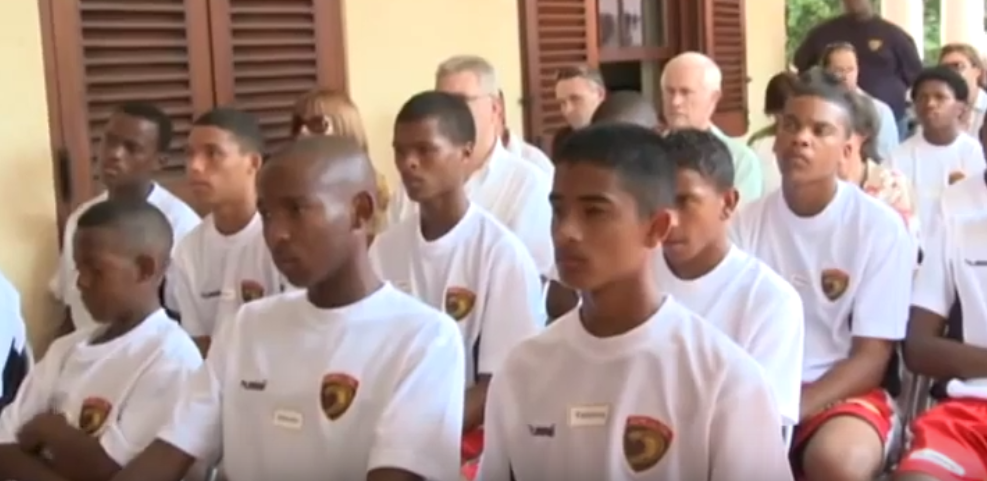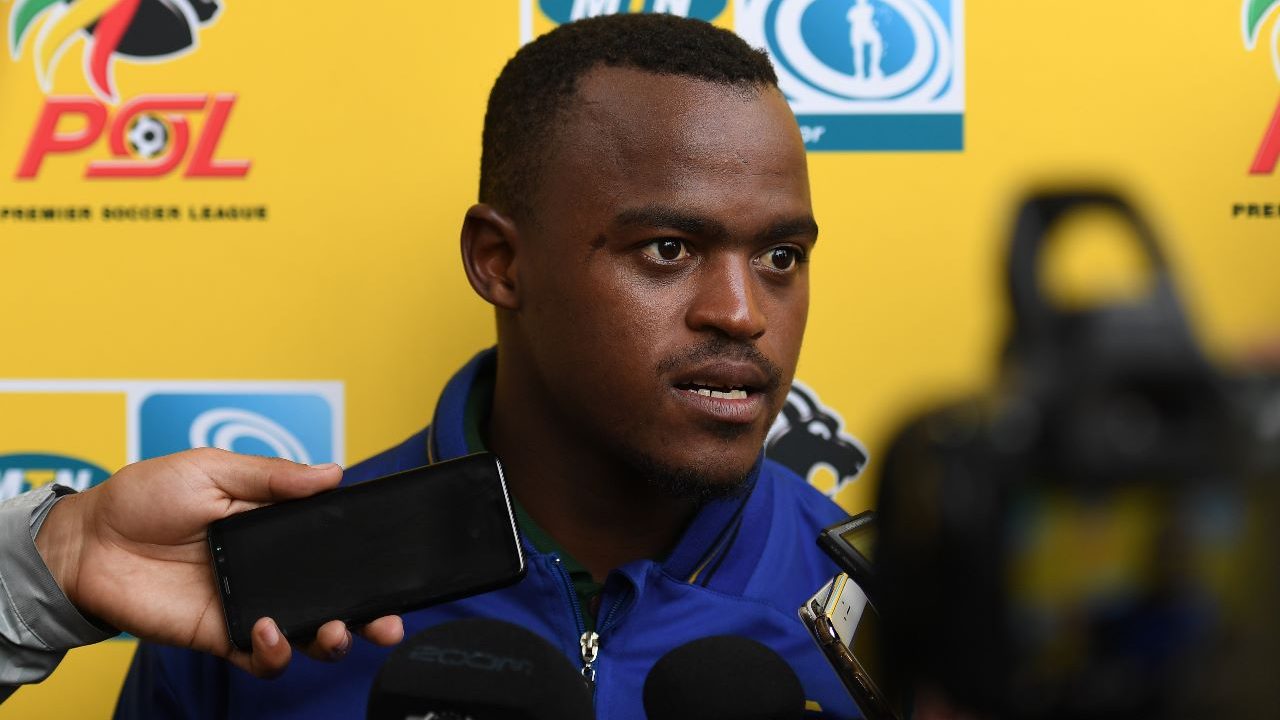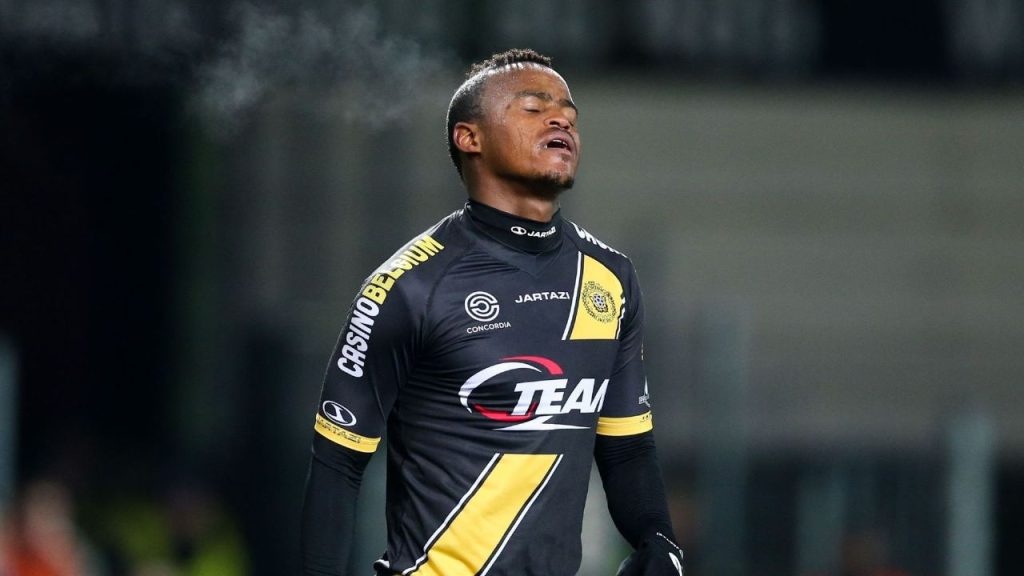When Ayanda Patosi was young, he had an insatiable hunger to chase the oval-shaped ball in the dusty streets of Site C, Khayelitsha, Cape Town.
Needless to say, almost every little boy in the township grows up kicking a soccer ball. Perhaps, the simple reason is that diski is the most common and accessible pastime ekasi.
But in Ayanda Patosi’s case, there was a mission behind it. Straight from school, his mother, Nombulelo Patosi, still pictures her seven-year-old boy hurriedly throwing his school bag on the bed and dashing out to play soccer.
There was barely much to eat at home. But that wouldn’t matter much with his young mindset on getting to the pitch and playing a game he treasured so much.
For a while, she never understood how serious the passion was until she witnessed two Isikhokelo Primary teachers lift him in the air after he had torn apart an opposition defence.
AYANDA PATOSI SHARED HIS DREAM WITH IAN WRIGHT
“Two teachers came to me and said your child plays football so well. They lifted him after he helped the school team win,” Nombulelo tells FARPost.
It became apparent that her little boy wanted to kick it all the way to stardom. In fact, Patosi tells Arsenal legend Ian Wright in a recorded interview in 2009 in Cape Town that he had a dream. That fantasy kept him away from the social ills associated with Site C.
Wright didn’t know this diminutive boy from one of Cape Town’s partially informal townships at all before that life-changing meeting. Neither was he told about him.

‘Wrighty’ was part of the cutting-edge scouting work the Africa Soccer Development Academy was doing. The Cape Town academy had just been launched.
“I am so passionate about football in South Africa. [I love] taking boys from the townships and allowing them to escape a life of poverty and crime. I’ve put my name to the school because it gives boys an education, proper food and hope,” Wright said.
Patosi, spotted playing for Western Cape Province’s Under 15 side, was not the only boy there.
There were about 30 youngsters eager to carve a niche for themselves in the game.
TRADEMARK RUNS
Interestingly, none of them knew this high-profile figure who had visited them from London. Understandably so, the Woolwich-born striker made his name with Arsenal’s title-winning 1997/98 squad when these boys were all tots.
Patosi himself was unborn when Wright joined Arsenal – a club he enjoyed the most success with over seven seasons.
The youngsters had been shown video clips of their guest during his heydays. Through those vids, they witnessed the former England forward boss defenders with his trademark perfectly timed runs. They also got to see those first-time shots that often hit the target.
There was no doubt in their little minds that this was definitely a guest they wanted to entertain. He was undoubtedly a man to listen to.

That’s all it was for young Patosi. A stranger coming through to preside over their training sessions for a few days, he thought.
His mind couldn’t have wandered any further than that. In any case, all odds were against him.
“His father died the previous year Ian Wright visited us; he was very young at the time,” his 60-year-old mother recalls.
In fact, for Patosi to even get to those training sessions, mom had to sell cassettes and other wares at the Cape Town station. However, there was no guarantee that her wares would be bought.
“Ayanda’s mom played a massive role in his career. She used to sell things at the train station so that Ayanda Patosi could go to the training. She wanted him to have train tickets. We know she would not make much, but she had to do everything to make sure he gets to training,” says Thabo Zele, a childhood mentor to Patosi.
MONEY WAS MADE AVAILABLE
From Khayelitsha’s Site C to a pitch behind Ajax Cape Town’s Ikamva training ground, a distance of about 25 km, he had to take two trains, each costing an average of R7. He would pass a good 12 stations.
“Telling him there was no money for him to go to training would make him cry; I had to do whatever I could to make sure that money was there,” explains Mama Nombulelo.

Till today, her son knows there were things they would lack in their small Site C shack, but his transport money was not one of them. Nonetheless, it remains a mystery for him how mom made sure the money was available all the time.
“I still ask myself how she made sure my transport money was there and how I could still have some food to carry to school.
“I think someone would pay R10 or R20 for a cassette, and they won’t buy more than one,” the Iran-based attacker tells FARPost.
So, life was far from being a stroll in the park for the youngster. Before his passing, his dad spoke as though he saw the days far ahead for his son.
“He used to say ‘this boy will play for Bafana’,” says Mama Nombulelo. It was as if he knew the boy was a star in the making. And so, when Wright watched those sessions, a touch of destiny hung over the boy’s head.
PATOSI’S STORY RESONATED WITH IAN WRIGHT’S
And after days of seeing these boys, he was convinced all Patosi had to do was aim for the stars. “I was told he had chosen me out of all the boys; he was going to interview me. He came to our shack in Site C and spoke to my mother about my talent,” he recalls with pride.
This young boy’s story possibly resonated with the former Arsenal ace. Born to Jamaican immigrants in southeast London, his biological dad had left him when he was young to grow up in abject poverty.
Just like Patosi, lack, drugs and all manner of social ills stared him in the face. Football was possibly the only escape from the harsh reality they both had.

Driving around Khayelitsha didn’t shock Wright at all, and seeing where this boy lived with his widowed mom wasn’t a shock. Having lived in a one-bedroomed house with an abusive stepfather and siblings was hellish enough for the Crystal Palace player of the Century.
If anything, Wright, who made the English Football Hall of Fame in 2005, knew these were all ingredients to spur this young boy on.
Even when he had to tell him his talent could unshackle him and his family from that situation, he knew what exactly it meant.
Of course, after juggling a football with Patosi as if to test his skills further, Wright said quite a lot of words about and to this boy.
A TURNING POINT IN HIS LIFE
Among those were the heartening remarks he said, “…. when I look at him, I look into his eyes I can see somebody who, if he carries on like this, can only do well.”
Maybe he could see the fire in the boy’s eyes. Perhaps the boy was still oozing that pure, innocent, naïve, childlike hunger. The innate hunger made him shed tears when there was no money to transport him to training.
Unsurprisingly, the talented attacker vividly remembers that day as though it happened yesterday.
He has not been able to put it at the back of his mind for so many reasons.
It was undoubtedly a turning point in his young life. Being applauded by this legendary figure opened him up to a world of possibilities.
Those words ring fresh in his mind as though they were said yesterday. “You could see the hunger in these guys; you could see all they need is a chance,” Wright said.
Interestingly, Patosi, who has had stints in Belgium, the UAE and Iran, has been the most successful of those boys.
Together with ‘Deco’, as he was affectionately known, were the likes of Lindani Ntamo, Ebrahim Seedat and Ntsikelelo Nyauza.
Another prominent figure, Anele Ngcongca, would be impressed by his talent in the same year. The then KRC Genk fullback would take it upon himself to start buying him soccer boots.
“Anele was too kind to my son,” Mama Nombulelo adds. The following year, aged 16, Ngcongca’s club invited Patosi with Ntamo.
As soon as Ayanda Patosi turned 18, Belgian side Lokeren couldn’t wait to have him in their books. He spent six years with them before returning home to join Cape Town City.
DAD’S PREDICTION CAME TRUE
His dad’s prediction came true in October 2013 when he made his international debut against Morocco.
His next three stints overseas were loan spells to Iran champions Esteghlal, Abu Dhabi side Baniyas and Foolad of Iran.

At the back of his mind, though, Wright’s words that he had the key to changing the lives of his family members kept ringing.
“Anele would keep telling me not to forget what my mother had done for me. So when I bought my mother a house, he was so proud of me. He actually went with his mother to see the house,” the 29-year-old star adds.
Even during his most extended injury spell, the desire to return and play football for his family’s sustenance kept him absorbed.
His mom is still in disbelief when she harks back to where they came from.
“I look and wonder if I’m the one staying in this place surrounded by rich people.”
With the two men – Ngcongca and Cecil Lolo – who played a pivotal role in his career gone, Patosi is motivated to make them proud.
RELATED STORY: The jail visit that rescued Mpho Makola’s career
